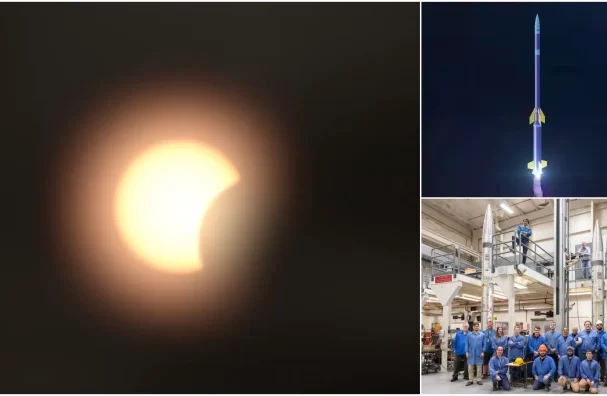
IMG SOURCE: nypost.com
In a recent venture, NASA launched three sounding rockets into the moon’s shadow during a solar eclipse. In a bid to understand how such celestial events impact Earth’s atmosphere, the rockets were launched at different stages of the eclipse.
NASA’s Wallops Flight Facility in Virginia was the launch site for these rockets. The first Atmospheric Perturbations around Eclipse Path (APEP) sounding rocket was launched 45 minutes before the eclipse. The second rocket took off at the peak of the eclipse, while the third was set off a few minutes later, according to the agency.
NASA’s mission aimed to study potential disturbances in Earth’s ionosphere during a total solar eclipse. These disturbances could potentially impact radio and satellite communications, making this study crucial for our communication systems.
Aroh Barjatya, a professor of engineering physics at Embry-Riddle Aeronautical University in Florida, led this mission. The rockets used for this mission were refurbished from a previous solar eclipse mission in October 2023.
Each rocket was designed to deploy several smaller rockets to measure the eclipse’s impact on the ionosphere. “Each rocket will eject four secondary instruments the size of a two-liter soda bottle that also measure the same data points, so it’s similar to results from fifteen rockets, while only launching three,” explained Barjatya.
The APEP rockets managed to reach an altitude of 260 miles, equivalent to the orbiting distance of the International Space Station. During the 2023 eclipse mission, the rockets detected significant disturbances in the atmosphere that could affect radio communications. This latest mission sought to confirm and expand these findings.
Monday’s eclipse was a crucial moment for this research, as the next total solar eclipse visible from the US isn’t until 2044. The APEP launches were livestreamed on NASA Wallops’ YouTube channel and on NASA’s broadcast of the solar eclipse.
NASA’s recent mission of launching sounding rockets during a solar eclipse offers new insights into how such astronomical events affect Earth’s atmosphere. The results of this mission could have significant impacts on our understanding of radio and satellite communications. With the next total solar eclipse over a decade away, this mission’s findings will likely guide future research in this area.
